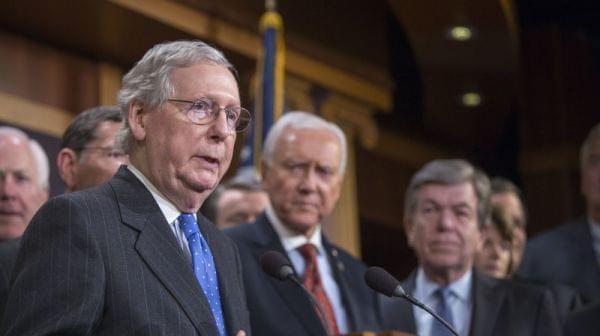Senate Approves Landmark Tax Overhaul, Bill Returns To House

Senate Majority Leader Mitch McConnell (left) speaks at the press conference after the senate vote of the tax reform bill on Wednesday in Washington, D.C . Tasos Katopodis/Getty Images
Republicans in Congress approved a sweeping and controversial $1.5 trillion tax overhaul, with the Senate voting early Wednesday along straight party lines to move the measure forward.
It is the first major rewrite of the tax code in more than three decades and it marks a huge legislative victory for President Trump and GOP lawmakers, who have seen their agenda stalled amid steadfast Democratic opposition and disarray within their own party. Passage of the tax cut, while unpopular across much of the political spectrum, speaks to the Trump base of the Republican party, and to businesses and wealthy Americans, who will accrue most of its windfalls.
Moments before the deciding vote was cast, a protest broke out in the Senate chambers, with chants of "Kill the bill, don't kill us!"
The vote was 51-48, with all Republicans voting in favor and all Democrats opposed.
President Trump tweeted about the vote shortly afterward:
The United States Senate just passed the biggest in history Tax Cut and Reform Bill. Terrible Individual Mandate (ObamaCare)Repealed. Goes to the House tomorrow morning for final vote. If approved, there will be a News Conference at The White House at approximately 1:00 P.M.
— Donald J. Trump (@realDonaldTrump) December 20, 2017
On Tuesday afternoon, the Senate parliamentarian ruled that two provisions in the bill would have to be removed, meaning that the House will need to vote again, with passage almost certain.
One provision at issue would allow families to use education savings accounts, often called 529 accounts, to pay for K-12 private schools and home-schooling expenses. The other would exempt private colleges and universities with fewer than 500 tuition-paying students from a new tax on their endowments.
Both provisions have been found to be in violation of the Byrd Rule, which governs the types of legislation that can be passed under reconciliation. Reconciliation is the process that allows budget bills to pass the Senate with 51 votes, without first getting the 60 votes needed to close debate. In part, the Byrd Rule says that provisions can't contain "extraneous matter" that doesn't pertain to the budget.
The House will reconvene Wednesday morning and is set to vote again then.
The House passed the final version of Republicans' $1.5 trillion tax overhaul on Tuesday afternoon, by a vote of 227-203.
That vote fell largely along party lines. No Democrats voted in favor of the bill, as was the case when the House passed its initial version of the bill in November. Twelve House Republicans voted against the bill.
Though the bill would lower tax rates for many Americans, it also is in large part a corporate tax cut, lowering the top federal corporate tax rate drastically, from 35 percent to 21 percent.
According to a new report from the nonpartisan Tax Policy Center, the plan would overwhelmingly benefit the richest Americans. In 2018, the center estimates an average tax cut of $1,610, but the average household earning more than $1 million would get a tax cut of nearly $70,000.
However, the bill makes most individual tax changes temporary, setting them to expire after 2025, while making corporate tax cuts permanent. Republicans did this so that the bill could meet budgetary rules they had set out for themselves.
That early sunset of individual tax cuts means that come 2027, more than half of Americans could see a tax increase, according to the Tax Policy Center report.
Speaking to reporters after the House vote, Ryan said Republicans plan on extending those provisions.
"We have every intent of making those permanent," he said.
"We have every intent of making those permanent -- because of the Senate rules, you know why that sunset is there," House Speaker Paul Ryan says on tax cuts for individuals https://t.co/xsyx7yEx7z pic.twitter.com/9LrDMqzLCC
— CBS News (@CBSNews) December 19, 2017
The bill is also set to add nearly $1.5 trillion to deficits over the next decade.
Republicans, eager to score a major legislative win, have pushed their tax overhaul through Congress at breakneck pace. Thus far, 47 days have passed since the Tax Cuts and Jobs Act was introduced in the House.
That is quick compared with the last time the tax code underwent major changes, with the Tax Reform Act of 1986. President Ronald Reagan signed that bill 323 days after it was first introduced in the House.
Loading...
That is not the only way that this tax overhaul effort differs from the Reagan overhaul in 1986. That one had bipartisan agreement, with "yes" votes from 116 Republicans, along with 176 Democrats, as C-SPAN Capitol Hill producer Craig Caplan pointed out Tuesday.
1986 tax reform bill passed House 292-136.
— Craig Caplan (@CraigCaplan) December 19, 2017
Yes 176 Democrats & 116 Republicans
No: 74 Democrats & 62 Republicans pic.twitter.com/kyFq7xULM4
Links
- House Republicans Pass Tax Overhaul; Senate Could Vote Tuesday Night
- CHARTS: See How Much Of GOP Tax Cuts Will Go To The Middle Class
- CHART: How The New Version Of The Republican Tax Bill Would Affect You
- Duckworth Talks Taxes, Spending, Quincy Veterans’ Home At Stop In Champaign
- 13th Congressional District Democratic Candidates Oppose GOP Tax Plan
- Teachers Want To Keep Classroom Supplies Tax Deduction
- Congressman Shimkus A Member Of The Committee Negotiating Final Version Of Tax Bill
- Senate Republicans Pass Massive Tax Overhaul
- Senate GOP Tax Bill Hits Speed Bump Over Deficits
- Illinois Delegation Votes Along Party Lines For House Tax Bill

